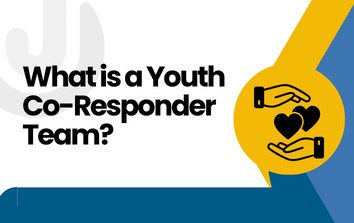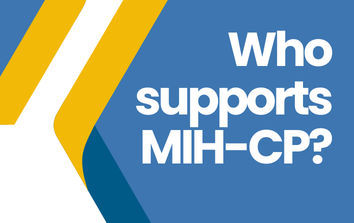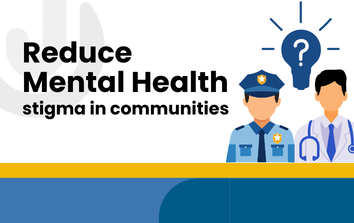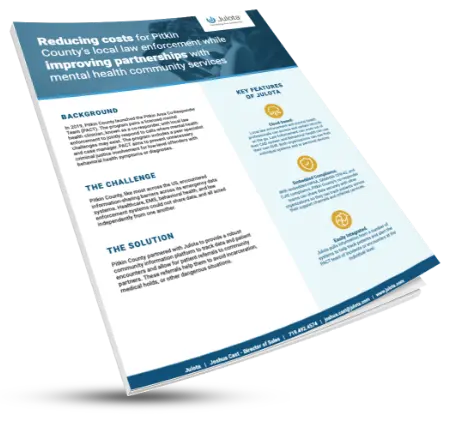Over the years, we have seen that studies demonstrate that up to 20% of criminal behaviour among those with mental illness is related to the illness itself.[1] According to studies, a whopping 15% of inmates in state prisons and 20% of inmates in county jails are estimated to have a mental illness. [2] Finding a solution to conserve public resources and reduce incarceration rates would help everyone involved – the city, the community, the individuals, and the entire system. The new jail diversion programs are emerging to help direct individuals to the resources they need. However, you might be wondering how to manage and track these programs? This is the very thing that the Julota software platform was built to help with.
Julota can aid in reducing the prevalence of those with mental illness in the jail and prison systems. Improve access to the mental health care they need, and improve the lives of general community members in turn. Here are five ways Julota makes jail diversion easier for people with serious mental illnesses.
- Officers can quickly check for availability at mental health clinics
As a police officer, imagine arriving at a mental health facility after experiencing a stressful incident due to a person having a severe mental health episode. Only to discover the facility is full and cannot accommodate your charge.
Situations like this may leave an officer with two unfortunate options. Either take the time to call around to other nearby mental health facilities until they find one that will accommodate the patient. Alternatively, abandon their mental health facility plan in favour of dropping off at the hospital or, even worse, incarceration. The latter may be a necessary decision for the officer, who is left with no other options.
Officers will no longer find themselves in this impossible situation with the help of the availability feature included in Julota’s platform. Julota, an acronym for Just Love On Them Always, allows the officer to easily and quickly check which local mental health facilities have bed openings. This simple feature removes the hassle of finding proper help for their patient. This way, patients can get the care they need, and officers can go back to helping the community.
Not only does Julota aid law enforcement in saving time. It allows the patient a better opportunity to receive the treatment they need more quickly.
- Officers can coordinate with the mental health clinics, notifying them they are on their way
Drop-off facilities unprepared for arrivals can lead to their patients and the officers needing to wait for what could be hours to begin intake. Patrol is out of service longer than it should be. Additionally, a willing consenting patient going to treatment could change to them walking out the front door. This wait can make an already tense situation even more so. With Julota’s platform, this means this no longer needs to be the case.
Communication is streamlined with Julota. With the simple touch of a button in Julota’s platform, law enforcement can quickly notify the mental health facility of their incoming patient. They allow the mental health facility to do what they need to prepare for an intake with a new or returning patient.
- Julota makes Data-Sharing Easy
One of the most challenging parts of launching any new jail diversion program is the communication involved. Law enforcement and mental health services were never built to be deeply integrated. Building that bridge so law enforcement and mental health services can coordinate is no small feat.
Given that Julota is a cloud-based HIPAA, CFR-42, and CJIS compliant platform, there is no need to worry about that. Messages from one organization meant for all responders will travel through the same compliant source. Increasing efficiency of communication and making sure patient data is only sent to the appropriate sources.
There will be no more need to worry about directly connecting to another agency’s system when dealing with interoperability or compatibility problems. As a highly integrative platform, Julota has made it easier for community responders to trust that their vital information to perform their duties will be accessible in real-time.
With Julota’s HIPAA-compliant health data system that also meets CJIS and 42 CFR Part 2 standards for managing substance use treatment data, partners in law enforcement and behavioural health care can quickly transfer data securely and safely – without needing to worry about penalties or fines for unintentionally violating those standards.
- Julota Helps Programs Be More Competitive for Grants.
It is already challenging enough for frontline workers, including law enforcement, to help community members to access the help they need. Maintaining, tracking, and organizing the resulting data magnifies the difficulty of this situation. The data management of your community aid program, which demonstrates your organization’s operationalization, is required of grant programs, a process that can be daunting.
With Julota, you can quickly gain access to the specific data you need. Data collection is done with our metric collection fields customized to track the data you need specific to your organization.
Julota has streamlined this process, so you can more easily focus on your program’s mission statement– helping others. This data tracking and organization means we have cut down on the time and hassle required to apply for future funding and secure bigger budgets., The data and reporting will demonstrate the efficacy of your program, as is required by grant funders and policymakers.
Julota makes it easier to make your organization a star by constantly improving upon your services. With easy and quick access to your data, you can see which areas of your program are a success, which may need improvement or phasing out.
Perhaps you are confident in your program’s success but do not have the data to show potential funders. Julota provides easy access to the data required to improve your program, demonstrate your results, and make a competitive case for funding.
- Never worry about cross-compliance across healthcare, criminal justice, and mental health
Navigating the compliance laws across mental health, healthcare, and law enforcement can be overwhelming. Many programs find it difficult to even begin because of how intimidating this can be. With Julota, you do not have to worry about falling into this trap.
Julota has made it easier than ever to implement a jail diversion program with our platform. Our integration of systems brings together different community services and law enforcement to collaborate efficiently. Completely HIPAA-/mental health (42 CFR part 2)-/Criminal Justice Information System- compliant. Thereby enabling secure integrated sharing of consented information, Julota aids patients in accessing treatments that fit their needs.
Secure data sharing is imperative when dealing with healthcare and law enforcement information. Finding a system not only to ensure information goes into the right hands but also one that enables multidirectional sharing may seem impossible. However, with Julota, it is not. We are using the highest level of data security. This software guards private information against getting into the wrong hands. Therefore your co-responder team and community members can get their work done. The helper community can provide the help they need, knowing sensitive information is protected.
- The success that comes with efficiency and security when dealing with integrated communication between different community health programs and law enforcement is undeniable with Julota. Jail diversion can help reduce the prevalence of people with mental illness in the jail and prison systems. Improving your program, easing the means of law enforcement in getting patients to mental health facilities, improves the lives of those in need and healthcare providers and law enforcement. All can benefit, and all this is made possible with Julota.
Sources
[1] Gill, K., & Murphy, A. (2017, December 03). Jail diversion for persons with serious mental illness coordinated by a prosecutor’s office. Retrieved March 01, 2021, from https://www.hindawi.com/journals/bmri/2017/7917616/
[2] Carroll, H. (n.d.). Serious mental illness prevalence in jails and prisons. Retrieved March 01, 2021, from https://www.treatmentadvocacycenter.org/evidence-and-research/learn-more-about/3695




